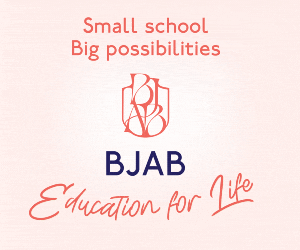 Teaching is focused more on the British or American school system, with a greater emphasis on public speaking, reading, writing and research. David-Ian thinks that these invaluable skills are very much lacking in the Belgian school system. In the Years 11 and 12, students have to take classes in the theory of knowledge and write an extended research essay on a topic of their choosing.
Teaching is focused more on the British or American school system, with a greater emphasis on public speaking, reading, writing and research. David-Ian thinks that these invaluable skills are very much lacking in the Belgian school system. In the Years 11 and 12, students have to take classes in the theory of knowledge and write an extended research essay on a topic of their choosing.
David-Ian recognises the impacts that technology and globalisation have on the job market. “We teach our students that they need to remain open: jobs become obsolete, new jobs will appear that never existed.” The school therefore aims to equip students with a number of skills that universities and employers are looking for: “good grades, languages, public speaking, multi-tasking and experience,” he says. “The more skills you have, the more choices you have and the more jobs you can do.” Students are taught in English but also learn French and Spanish. Chinese will be introduced next semester. Recognizing the importance of being digitally savvy, older students can take digital design classes, learning how to code and build websites. Community engagement is also emphasized, and depending on their programmes, students are either obliged or strongly encouraged to do serve the community or volunteer for a particular cause.
With many an international or European schools to choose from in Brussels and beyond, Bogaerts International school is up against stiff competition. David-Ian thinks the school’s critical thinking philosophy sets them apart, as does its fees, which tend to be lower. “I read that Belgium has the third most expensive international schools in the world,” he exclaims. “People are not capable of paying such high fees. I thought, ‘I can do better than that.’” High fees evidently mean ultra-state-of-the art facilities, a luxury that David-Ian questions the utility of: “Do we need ‘Disney World’? Our facilities are pretty nice but the quality of the teaching is more important.”
The school, located in an écrin de verdure, is accessible for students living far and wide, with school buses serving Evere, Montgomery and Waterloo. It is a twenty-minute train ride from the Brussels Schuman and Luxembourg area, and trains go regularly to Moensberg or Linkebeek stations, which are only a short bus ride away from the school (the school provides a shuttle service from Linkebeek).
With a student population increase of 25% compared to last year, the Bogaerts International School seems to have chimed with both the expats and local population. David-Ian hopes that the school also provides satisfaction to Belgian parents disappointed with Belgian schools.
David-Ian runs a school, but he acknowledges that it is a business. A business, which he doesn’t see as a mere job, but rather as an enjoyment that has been part of the family for nearly 40 years. Having business acumen can only be an advantage when encouraging his students to try new things and make mistakes. The School of Rock is an excellent example: “I say to the kids, ‘just make a start, even if you make mistakes, just have fun. Don’t worry about the theory just yet. If you like it, then you can start learning the theory,’” he says. He uses the same principle with the school: “If something’s not working, I say to my staff, ‘We don’t do it, let’s try something else.’ We don’t do something just to please a parent or for marketing purposes.”
As I get ready to leave, David-Ian shows me a video of some children, about 10 years old, playing in the School of Rock’s band. A little boy bangs the drum to a simple beat; a boy plays on the keyboard, helped along by software; a girl and a boy roar the song lyrics into the microphone. They are all complete beginners and yet, feel right at home doing something new. “You see?” He asks, his face lighting up. “The kids just love it.”
www.bischool.com






